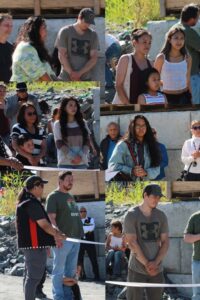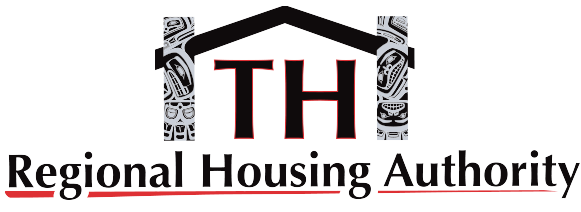 On Thursday, August 28, 2025, the Douglas Indian Association (DIA), Tlingit Haida Regional Housing Authority (THRHA), and Haa Yakaawu Financial Corporation (HYFC) came together to celebrate a milestone for our community: the ribbon cutting ceremony for six new homes at the Crow Hill development site in Juneau.
On Thursday, August 28, 2025, the Douglas Indian Association (DIA), Tlingit Haida Regional Housing Authority (THRHA), and Haa Yakaawu Financial Corporation (HYFC) came together to celebrate a milestone for our community: the ribbon cutting ceremony for six new homes at the Crow Hill development site in Juneau.
The event opened with a welcome from Jackie Pata, followed by Douglas Indian Association leaders Barbara Cadiente-Nelson and Andrea Cadiente Laiti, who shared the history of DIA and the importance of Tlingit homes in Douglas. Their words reminded us that this project is not just about housing—it is about cultural continuity, community strength, and honoring the vision of our ancestors.
As part of the ceremony, Paul Marks offered a blessing with devil’s club, giving each homeowner this powerful medicine. Devil’s club, long known in Tlingit culture as “good medicine,” was presented to provide peace, prosperity, and protection for each person who will live in these homes.
The program continued with the ribbon cutting, introductions of the homeowners, and traditional Raven and Eagle songs, marking this day as a true cultural and community celebration.
🏡 Homeowner Stories
- Joseph Marks – From graduate student to professor, Joseph balanced a Master’s degree, full-time work, and now a PhD program in Sitka. As he steps into a faculty role at UAF, this home gives him stability as he begins shaping the next generation of Alaskans.
- Robert Sharclane – A single father of three daughters and counselor at Gastineau Human Services, Robert created a safe and stable foundation for his family, showing resilience and dedication to his girls’ future.
- Christina Kadake – A single mom of three, Christina partnered with HYFC’s financial counseling team, paid off all her debts, and even earned a promotion at IGA Foodland. Today, she stands proudly as a debt-free homeowner.
- Amanda Bagoyo – A single mom of two and longtime employee at Catholic Community Services, Amanda not only saved diligently but also learned hands-on construction skills while helping with her home’s insulation. Her story reflects persistence and strength.
- Jonah Davis – An electrician with Tongass Electric, Jonah contributed his skills to many THRHA projects—but this time, he helped build his own home. His journey has come full circle as he prepares to start a family in a house he helped construct.
- Anna Larue – A SEARHC employee of 19 years and single mom of four, Anna waited patiently for this moment. With strong credit, savings, and a legacy of perseverance, she is now building generational stability for her children.
A Community Effort
This project is the result of strong partnerships between Douglas Indian Association, THRHA, and HYFC, with support from key funders who helped provide gap financing. Each home represents stability, equity, and a lasting investment in future generations.
Looking Ahead
As we welcomed the six new homeowners into their homes, we celebrated more than just construction—we celebrated lives being transformed, families being rooted, and dreams becoming reality.
Gunalchéesh / Háw’aa to everyone who helped make this possible.

